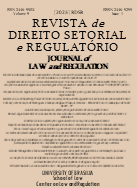Table of Contents
Keywords:
regulation, sanitationAbstract
We take great pleasure in introducing this special edition of the Journal of Sectorial and Regulatory Law, which is the culmination of the endeavors of the National Study Group on Basic Sanitation Law (GESANE). The fundamental aim behind the creation of this group is to generate and disseminate erudition in the realm of basic sanitation, while also facilitating a liaison between academia and industry experts operating in various domains such as Administration, regulatory authorities, oversight agencies, Judiciary, public, and private service providers.
The activities of GESANE commenced soon after the enactment of Law 14.026/2020, which brought about profound changes to Law 11.445/2007, and established a necessary reform in the sector, with the primary objective of achieving the universalization of services, ensuring access to potable water for 99% of the population, and providing adequate sewage collection and treatment for 90%. This objective is essential and ambitious, given that, as per the SNIS data of 2021, 15.8% of the Brazilian population lacked access to water, and an impressive 44.2% lacked adequate sanitary sewage disposal.
To facilitate the achievement of the universalization goal, the lawmaker delegated regulatory powers concerning basic sanitation to the National Water Agency, promoted regionalized service provision, formalized existing relationships, and introduced competitive selection of new service providers, among other noteworthy changes. However, these changes are merely the beginning and not the end, and they persistently occur (as seen, for instance, in the recent Decrees No. 11.466 and 11.467/2023), which poses continuous challenges for academia, sectoral economic agents, and norm interpreters.
The articles compiled in this publication are the outcome of research conducted by the members of the group. They serve as a valuable resource for the ongoing discussion surrounding the intricate landscape of basic sanitation, its principal hurdles, and opportunities. The articles are categorized into the following sections:
- Sectorial reform;
- Institutional arrangements;
- Service regulation aspects;
- Financial considerations;
- Service regionalization;
- Challenges posed in the new millennium..
It is evident that achieving universal access to water and sewage is a lengthy and difficult process. The accomplishment of this objective will undoubtedly necessitate the mobilization of all legal operators' creative abilities. We express gratitude to all Gesane members who played an active role in creating this special edition. Our expectation is that the published works will inspire readers to engage in the crucial advancement of basic sanitation in the country.
Downloads
References
--
Downloads
Published
How to Cite
Issue
Section
License
Copyright (c) 2023 Journal of Law and Regulation

This work is licensed under a Creative Commons Attribution 4.0 International License.
By submitting this paper to the Journal of Law and Regulation, I hereby declare that I agree to the terms of the Creative Commons Attribution 4.0 International (CC BY 4.0), available at http://creativecommons.org/licenses/by/4.0.


